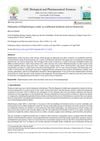 119 citations,
January 2012 in “Nutrition & Metabolism”
119 citations,
January 2012 in “Nutrition & Metabolism” Modern lifestyles, including poor diet, stress, and long-term use of certain medications, hinder the body's ability to heal from inflammation, leading to chronic diseases.
 May 2011 in “British Journal of Dermatology”
May 2011 in “British Journal of Dermatology” The 1891 epidemic skin disease was likely caused by arsenic poisoning, possibly from beer or fish.
 2 citations,
October 2022 in “International journal of Ayurvedic medicine”
2 citations,
October 2022 in “International journal of Ayurvedic medicine” Licorice has many traditional health benefits, but more research is needed to fully support these claims.
 38 citations,
December 2009 in “Therapeutic Advances in Medical Oncology”
38 citations,
December 2009 in “Therapeutic Advances in Medical Oncology” The conclusion suggests that prostate cancer should be classified by castration status and that new therapies targeting androgen receptor signaling show promise.
 23 citations,
February 2021 in “Journal of Endocrinological Investigation”
23 citations,
February 2021 in “Journal of Endocrinological Investigation” Betacoronaviruses, like COVID-19, may cause hormone system dysfunction and affect disease susceptibility and severity.
 26 citations,
October 2012 in “Dermatologic Clinics”
26 citations,
October 2012 in “Dermatologic Clinics” The document details hair transplantation techniques and innovations, highlighting Follicular Unit Transplantation as the standard and discussing the effectiveness and challenges of the procedure.
 1 citations,
June 2019 in “Food Research”
1 citations,
June 2019 in “Food Research” Tempeh oil rich in linoleic acid may protect against skin aging caused by UV light.
 46 citations,
September 2013 in “PLOS ONE”
46 citations,
September 2013 in “PLOS ONE” Thyrotropin-Releasing Hormone helps heal wounds in frog and human skin.
 60 citations,
April 2018 in “Clinical, cosmetic and investigational dermatology”
60 citations,
April 2018 in “Clinical, cosmetic and investigational dermatology” Tight hairstyles and chemical relaxers can cause hair loss known as traction alopecia.
 4 citations,
July 2013 in “Journal of Dermatological Science”
4 citations,
July 2013 in “Journal of Dermatological Science” Pregnancy right after giving birth in mice lacking IL-10 causes milk that leads to liver issues and hair loss in their babies.
9 citations,
May 2021 in “Frontiers in aging neuroscience” Taking triterpenoids from Ganoderma lucidum over a long time can help slow down brain aging and improve overall health in mice.
 45 citations,
January 2020 in “Pharmaceutical Biology”
45 citations,
January 2020 in “Pharmaceutical Biology” Dendrobium officinale polysaccharides may help with hair growth, skin moisturization, and protection against oxidative damage.
 108 citations,
December 2003 in “Lasers in surgery and medicine”
108 citations,
December 2003 in “Lasers in surgery and medicine” ICG-enhanced NIR laser therapy may be a promising acne treatment with improvement and no side effects.
 5 citations,
February 2024 in “Frontiers in bioengineering and biotechnology”
5 citations,
February 2024 in “Frontiers in bioengineering and biotechnology” Electrospun scaffolds can improve healing in diabetic wounds.
3 citations,
February 2024 in “International journal of molecular sciences” Hesperidin from orange peels is a promising natural ingredient for skincare due to its multiple beneficial properties.
 75 citations,
January 2014 in “Korean Journal of Urology”
75 citations,
January 2014 in “Korean Journal of Urology” 5α-reductase inhibitors can cause sexual problems, higher risk of aggressive prostate cancer, and depression.
 38 citations,
September 2019 in “Chinese Medical Journal”
38 citations,
September 2019 in “Chinese Medical Journal” Using steroids can increase the risk of heart problems.
 71 citations,
October 2008 in “The journal of investigative dermatology/Journal of investigative dermatology”
71 citations,
October 2008 in “The journal of investigative dermatology/Journal of investigative dermatology” HFMs can help study hair growth and test potential hair growth drugs.
 3 citations,
April 2021 in “GSC Biological and Pharmaceutical Sciences”
3 citations,
April 2021 in “GSC Biological and Pharmaceutical Sciences” Elephantopus scaber has many health benefits, including antibacterial, antifungal, anticancer, and antioxidant properties.
 8 citations,
October 2016 in “Actas Dermo-Sifiliográficas”
8 citations,
October 2016 in “Actas Dermo-Sifiliográficas” FFA in men, often mistaken for other hair loss types, may be more common than thought and needs larger studies for confirmation.
 January 2008 in “Pratique médicale & chirurgicale de l'animal de compagnie”
January 2008 in “Pratique médicale & chirurgicale de l'animal de compagnie” Alopecia X in dogs is a cosmetic issue, not a hormonal disorder, and harmful treatments should be avoided.
6 citations,
March 2022 in “International journal of molecular sciences” Natural skincare products may help reduce sun damage and support the skin's daily cycle.
 1 citations,
November 2015 in “Indian Journal of Clinical Biochemistry”
1 citations,
November 2015 in “Indian Journal of Clinical Biochemistry” The conference presented findings on how vitamin D levels, genetic factors, and lifestyle choices like smoking and yoga affect various health conditions and diseases.
 12 citations,
January 2015 in “Indian Journal of Dermatology, Venereology and Leprology”
12 citations,
January 2015 in “Indian Journal of Dermatology, Venereology and Leprology” A mother and daughter with similar hair loss conditions and identical HLA types suggest a genetic link between the conditions.
 27 citations,
June 2015 in “Revista Brasileira de Farmacognosia”
27 citations,
June 2015 in “Revista Brasileira de Farmacognosia” Safflower has been used in traditional medicine for centuries and shows promise in treating heart, brain, and inflammatory conditions, but more research is needed to ensure its safety.
 4 citations,
December 2020 in “Journal of Dermatology”
4 citations,
December 2020 in “Journal of Dermatology” Impaired autophagy may cause hair loss by triggering early catagen.
1 citations,
January 2024 in “Microorganisms” Mice with a virus similar to COVID-19 had skin damage, but a special treatment helped repair it.
 68 citations,
March 2018 in “Biomaterials”
68 citations,
March 2018 in “Biomaterials” Tiny needles with valproic acid can effectively regrow hair.
 27 citations,
April 2020 in “Molecular Biology and Evolution”
27 citations,
April 2020 in “Molecular Biology and Evolution” Ancient Chinese goats evolved cashmere-producing traits due to selective breeding, particularly in genes affecting hair growth.
 15 citations,
July 2019 in “Journal of Investigative Dermatology”
15 citations,
July 2019 in “Journal of Investigative Dermatology” CBD can either reduce inflammation and not affect hair growth at low levels or inhibit hair growth at high levels.

























